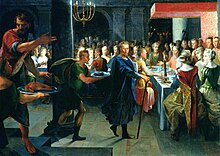
Summary
Francus or Francio is a mythological figure of French medieval historians which referred to a legendary eponymous king of the Franks, a descendant of the Trojans, founder of the Merovingian dynasty and forefather of Charlemagne. In the Renaissance, Francus was generally considered to be another name for the Trojan Astyanax (son of Hector) saved from the destruction of Troy. He is not considered to be historical, but in fact an attempt by medieval and Renaissance chroniclers to model the founding of France upon the same illustrious tradition as that used by Virgil in his Aeneid (which had Rome founded by the Trojan Aeneas).[1]

The 7th century Chronicle of Fredegar contains the oldest mention of a medieval legend thus linking the Franks to the Trojans.[2] The Carolingian Liber historiae Francorum elaborates new details,[3] and the tradition continued to be elaborated throughout the Middle Ages, when it was taken seriously as genealogy and became a "veritable form of ethnic consciousness".[4]
The 8th-century Historia Brittonum, borrowing from the 6th-century Frankish Table of Nations, makes mention of Francus as one of the four sons of Hisicion (Francus, Romanus, Alamanus, and Brutus), grandsons of Alanus, the first man to live in Europe.[5]
The Grandes Chroniques de France (13th - 15th centuries), a vast compilation of historic material, make reference of the Trojan origins of the French dynasty.[6]
Johannes Trithemius' De origine gentis Francorum compendium (1514) describes the Franks as originally Trojans (called "Sicambers" or "Sicambrians") after the fall of Troy who came into Gaul after being forced out of the area around the mouth of the Danube by the Goths in 439 B.C. (section 1, p, 33). He also details the reigns of each of these kings—including Francus (section 43, p. 76) from whom the Franks are named—and their battles with the Gauls, Goths, Saxons, etc.[7]
Annio da Viterbo also describes the arrival of Trojans into Gaul.[8]
Based on the medieval legend, Jean Lemaire de Belges's Illustrations de Gaule et Singularités de Troie (1510–12) has Astyanax survive the fall of Troy and arrive in Western Europe. He changes his name to Francus and becomes king of Celtic Gaul (while, at the same time, Bavo, cousin of Priam, comes to the city of Trier) and founds the dynasty leading to Pepin and Charlemagne.[9] He is said to have founded and named the city of Paris in honor of his uncle Paris.
Gilles Corrozet's La Fleur des antiquitez... de Paris (1532) describes Francis I as the 64th descendant of Hector of Troy.[10]
Lemaire de Belges' work inspired Pierre de Ronsard's epic poem La Franciade (1572). In this poem, Jupiter saves Astyanax (renamed Francus). The young hero arrives in Crete and falls in love with the princess Hyanthe with whom he is destined to found the royal dynasty of France.
See also edit
In the tradition of translatio imperii, many medieval authors established Greek or Roman genealogies for European dynasties:
- Brutus of Troy - the legendary founder of Britain
- Benoît de Saint-Maure, in his Chronique des ducs de Normandie, linked the Plantagenet family to Aeneas.[11]
References edit
- ^ Jerry C. Nash. Review of National Myths in Renaissance France: Francus, Samothes and the Druids The French Review, Vol. 69, No. 6 (May, 1996), pp. 1043-1044.
- ^ (in French) Geneviève Hasenohr and Michel Zink, eds. Dictionnaire des lettres françaises: Le Moyen Age. Collection: La Pochothèque. Paris: Fayard, 1992. pp. 472. ISBN 2-253-05662-6
- ^ Jean Seznec, The Survival of the Pagan Gods, (B.F. Sessions, tr.) 1995:19 and note 24.
- ^ P. Alphandéry, "L'Evhémerisme et les débuts de l'hitoire de religion au Moyen-Âge", Revue de l'histoire de religion 109 (1934:1-27) quoted in Seznec 1995:19 note 25; see also ethnogenesis.
- ^ History Of The Britons (Historia Brittonum) by Nennius, translated by J. A. Giles [1] Archived 2012-10-13 at the Wayback Machine
- ^ (in French) Geneviève Hasenohr and Michel Zink, eds. Dictionnaire des lettres françaises: Le Moyen Age. Collection: La Pochothèque. Paris: Fayard, 1992. p. 296. ISBN 2-253-05662-6
- ^ Johannes Trithemius, De origine gentis Francorum compendium: an abridged history of the Franks, translated by Martin Kuelbs, Robert P. Sonkowsky (AQ-Verlag, 1987). Google Books
- ^ Malcolm C. Smith. Review of National Myths in Renaissance France: Francus, Samothes and the Druids The Modern Language Review, Vol. 90, No. 1 (Jan., 1995), p. 182.
- ^ (in French) Michel Simonin, ed. Dictionnaire des lettres françaises - Le XVIe siècle. Paris: Fayard, 2001, p.726. ISBN 2-253-05663-4
- ^ Jerry C. Nash, op. cit.
- ^ David Coward, A History of French Literature (Blackwell, 2002), p.13. ISBN 1-4051-1736-2
Further reading edit
- R.E. Asher. National Myths in Renaissance France: Francus, Samothes and the Druids (Edinburgh Univ Press, 1993) ISBN 978-0-7486-0407-4


